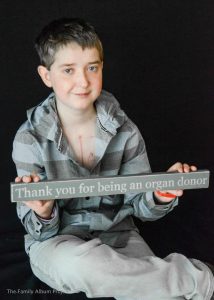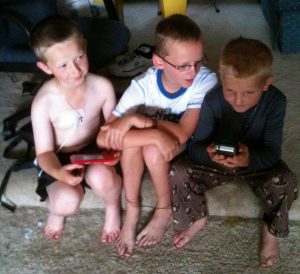Experiencing the Other Side of Organ Donation
Written by |

On Aug. 7, my son Cullen celebrated his six-year anniversary of having a heart and double-lung transplant. In last year’s anniversary column, I shared the joys and struggles that come with this miraculous gift. Taking care of new organs is an enormous responsibility. The reality that Cullen would no longer be with us if not for his organ donor has made his post-transplant struggle well worth the effort.
I do my part to advocate for organ donation, especially on Cullen’s transplant anniversary. Some might think it’s easy for me to do as the mother of a recipient and not that of a donor.
I assure you I have never taken for granted the fact that Cullen’s life was saved because someone else died. I understand the enormity of the decision because our lives have been deeply touched by both the recipient and the donor experiences.
While watching our son Aidan’s baseball practice nine years ago, my mother-in-law called my husband with horrible news. Our nephew, Jackson “Jack” Steele, had died in a tragic accident just five days before his 12th birthday.
In tears, and trembling with disbelief, we told our boys. Our family had been mentally preparing for the possibility of someday losing Cullen to pulmonary hypertension. To unexpectedly lose Jack, who was smart and fun-loving, at such a young age caused a ripple of shock that can’t be properly described.
My brother- and sister-in-law, Rick and Joan Steele, managed through their own shock and grief to sign a permission form donating Jack’s organs. That to me is the ultimate example of kind and generous hearts.
I interviewed Rick and Joan via email about their decision. Their openness and honesty provide a glimpse into organ donation from what might be considered the darker side of the transplant fence. Both are registered donors themselves.
“There was no hesitation on our part that it was the right thing to do,” Rick and Joan said, asking that their answers to my questions be attributed to both of them. “It was an opportunity to bring some good to another family out of our loss.”
If you are undecided about registering as an organ donor, Rick and Joan offer encouragement. “You have the choice of what you would like to donate and can donate to the extent in which you feel comfortable,” they noted.
The reason behind their choice is powerful: “For Jackson, we authorized ALL viable organs and tissues. How could we not take that step to possibly save another family from having to go through a terrible loss like we did?”
I asked if they had discussed organ donation with Jack. They vaguely remember sharing their core beliefs with him following a relevant news story. However, they don’t recall any in-depth conversation about it.
“He was young, and we didn’t want him to be scared about losing his parents,” they wrote. “Nor did any of us consider the possibility of him going first.”
Jack’s vital organs were unfortunately not viable for donation, but his corneas, heart valves, and other tissues were used. They believe Jack would be very happy that he was able to help others.
I was curious if, based on their experience, they would recommend that parents discuss organ donation with their children. They believe it is too sensitive a topic for very young children. “However, if an opportunity presents itself, we think it is good to introduce the topic,” they wrote. “Opportunities can be hearing a news story about the impact of organ donation, or losing a loved one, or a classmate facing a health issue.”
A year after donating their son’s organs, Rick and Joan attended a recognition event for donor families. They were asked to bring a picture of their loved one and share something special. “It was very nice to meet other families that had experienced loss,” they wrote.
They also were given the opportunity to write a letter to recipients, and the donation organization forwarded it. “We did write a letter describing Jack, so the recipients knew something about the boy whose organs/tissues they received,” Rick and Joan wrote, “but sadly, we did not get any responses.”
They were advised that feelings of guilt often keep recipients from responding. Rick and Joan understand that survivor’s guilt is hard, but they want Cullen and other recipients to know that they did nothing to cause the loss.
They offered the following consolation to recipients and those on the transplant waiting list: “By accepting the gift of donation, you are actually helping the family have a piece of their loved one live on. In some situations, that may be the only comfort the donor family has. Knowing that something wonderful like saving a life was possible because of the tragedy helps to ease the pain of such a tragic loss.”
***
Note: Pulmonary Hypertension News is strictly a news and information website about the disease. It does not provide medical advice, diagnosis, or treatment. This content is not intended to be a substitute for professional medical advice, diagnosis, or treatment. Always seek the advice of your physician or other qualified health provider with any questions you may have regarding a medical condition. Never disregard professional medical advice or delay in seeking it because of something you have read on this website. The opinions expressed in this column are not those of Pulmonary Hypertension News or its parent company, Bionews, and are intended to spark discussion about issues pertaining to pulmonary hypertension.







Leave a comment
Fill in the required fields to post. Your email address will not be published.